Synopsis of the 2018 Summer Seminar Series
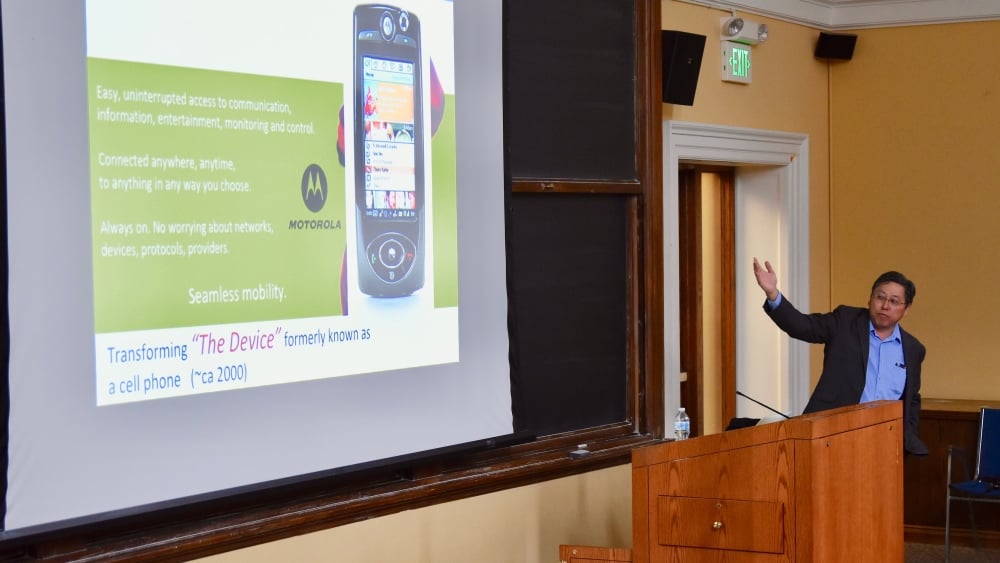
To facilitate learning and exposure to various research fields, INBT and the Physical Sciences-Oncology Center (PS-OC) hosts a seminar series every summer with experts in areas of nanoscience, medicine, and engineering. Organized by INBT post-docs Sarvenaz Sarabipour and Nash Rochman, the 2018 series welcomed eight guest speakers across the Johns Hopkins community and University of Maryland.
Dr. Dorothy Beckett, University of Maryland, Multi-level investigation of Allostery: The Second Secret of Life
While allosteric processes were identified almost 100 years ago, the ways by which these mechanisms regulate signal transduction along the protein structure remains mostly unknown. Beckett presented her lab’s ongoing work on the allosteric mechanisms of the bifinctional proteins, specifically BirA. She further emphasized applying a broad range of approaches from genetics to computational chemistry to understand protein signaling.
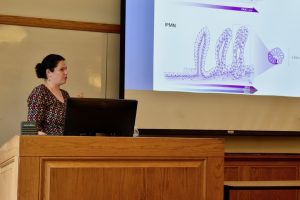
Laura Wood, JHU School of Medicine and INBT
Dr. Silvia Muro, University of Maryland and Institute for Bioengineering of Catalonia (IBEC), Barcelona, Spain, Targeting and Transport of Drug Delivery Systems: Mechanisms and Applications
Muro’s newest research focuses on drug carrier design and strategies to deliver therapeutic agents to specific areas of body. Her team uses polymer carriers functionalized with affinity and signaling moieties, focusing on understanding the parameters that regulate transport of drug delivery vehicles across cellular barriers and into cells of subjacent tissues. Furthermore, her results examined these aspects using cell culture models with validation in laboratory animals to correlate the observed mechanisms with in vivo outcomes.
Dr. Kimberly Stroka, University of Maryland, Cues from the Blood-Brain Barrier Alter the Migration of Metastatic Breast Tumor Cells
Stroka’s recent work with blood-brain-barrier (BBB) microenvironment analyzes the brain’s microvascular endothelium and the surrounding cells, which includes pericytes, neurons, and astrocytes. Through an integrated engineering and biological approach, Stroka’s team tested physiologically relevant environments that can mimic the BBB. Additionally, they observed how BBB interactions with the surrounding cells via tight junctions affects cancer cell migration.
Dr. Ralph Hruban, Department of Pathology, Johns Hopkins University School of Medicine, A “Clearer” View of Three-Dimensional Pancreatic Anatomy and Pathology
Visualizing human diseases in two-dimensions has been used for a long time. However, Hruban’s research team uses a three-dimensional visualization technique to study pancreatic cancer pathology. The technique allows clinicians to measure lesions more accurately and further defines the spatial relationship between various cell and tissue components in the appropriate multidimensional context. In his talk Dr. Hruban described a clearing and labeling method which allows visualization of a thick section of healthy and diseased pancreas in 3-D.
Dr. Andrew Feinberg, Director of the Center for Epigenetics, Chief of the Division of Molecular Medicine in the Department of Medicine, Johns Hopkins University, Cancer Is A Disease of Epigenetic Stochasticity
Feinberg discussed his team’s research on cancer epigenomics and findings on large-scale reprogramming of chromatin and DNA modifications during the natural evolution of distant metastasis, with dependence on the oxidative branch of the pentose phosphate pathway. Additionally, his team is focusing on developing a novel stochastic mathematical approach to understanding the nature of epigenetic information and its relationship to environmental exposure and biological function.
Ms. Kelly Clark, Teaching Institute, Johns Hopkins University, Does Teaching Come at The Expense of Research? How Has Teaching Evolved in Higher Education? What Can Undergraduate and Graduate Students Do to Prepare For Today’s Job Market?
Clark facilitated an exploration of the nexus of teaching and research and a dialogue on whether teaching and research are mutually exclusive endeavors. She discussed the evolution of teaching and learning in higher education and how instructors can teach differently so students can learn more. Information on career prospecting and the Johns Hopkins Teaching Academy’s professional development offerings were also shared.
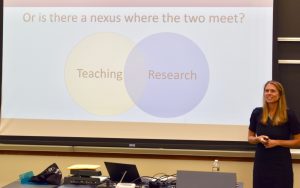
Kelly Clark, Johns Hopkins Teaching Institute
Dr. Laura Wood, Department of Pathology, Johns Hopkins University School of Medicine, INBT, In Vitro Models of Pancreatic Tumorigenesis
Wood’s research team studies non-invasive pancreatic precursor lesions, including pancreatic intraepithelial neoplasia (PanIN) and intraductal papillary mucinous neoplasm (IPMN). Their investigation of genetic alterations in these precursor lesions can help determine the timing of somatic mutations in pancreatic tumorigenesis and provide insights into clonal evolution in pancreatic neoplasia. She also discussed genetic analysis of pancreatic cancer precursor lesions and the correlation of these findings with experiments in novel in vitro models of pancreatic neoplasia.
Dr. Larry Nagahara (top image), Associate Dean of Research, Johns Hopkins University, Coming Full Circle: Life in Academia, Industry, & Government, Practical Implementation Of Sensors For Biomedical Application
His full circle career, which started in academia and then moved to industry and then government, followed by his return to academia, provides Nagahara with many research perspectives. He discussed how The Internet of Things (IoT) serves as an example of many promising technologies that could improve several areas of modern day living. While many innovations in IoT-related sensors spawned from academic labs, successful translation into commercial products requires assistance over multiple stages. His full circle journey illustrates the benefits of partnerships across academia, industry, and government toward practical implementation of biomedical sensor applications.
The seminar series is a place for researchers to share knowledge and experience with their community. Through this sharing, it facilitates and atmosphere where professionals can network with professionals, build collaborations, and gain new knowledge to use in their own work.
Latest Posts
-
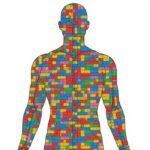 Cellular building blocks may enable new understanding of the body’s “machinery”
December 19, 2025
Cellular building blocks may enable new understanding of the body’s “machinery”
December 19, 2025
-
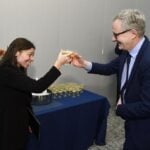 Biomedical Engineer Jamie Spangler Receives President’s Frontier Award
December 15, 2025
Biomedical Engineer Jamie Spangler Receives President’s Frontier Award
December 15, 2025
-
 Johns Hopkins Postdoc Named in Forbes `30 Under 30′ List
December 8, 2025
Johns Hopkins Postdoc Named in Forbes `30 Under 30′ List
December 8, 2025


